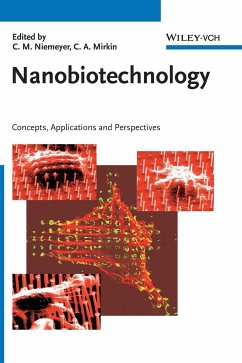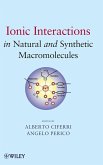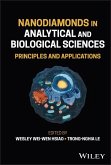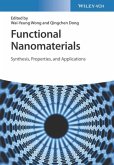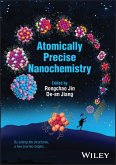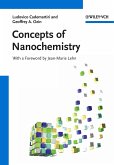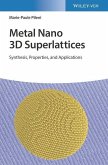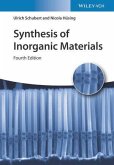Nanotechnology is the key technology of the 21st century. The possibility to exploit the structures and processes of biomolecules for novel functional materials, biosensors, bioelectronics and medical applications has created the rapidly growing field of nanobiotechnology.
Designed as a broad survey of the field, this book combines contributions from bioorganic and bioinorganic chemistry, molecular biology, materials science and bioanalytics to fathom the full scope of current and future developments.
It is divided into four main sections:
- Interphase Systems
- Protein-based Nanostructures
- DNA-based Nanostructures
- Nanoanalytics
Each chapter describes in detail currently available methods and contains numerous references to the primary literature, making this the perfect "field guide" for chemists, biologists and materials scientists who want to explore the fascinating world of nanobiotechnology.
Ein breit angelegter Überblick über das Forschungsgebiet der Nanobiotechnologie mit Beiträgen aus der bioorganischen und bioanorganischen Chemie, der Molekularbiologie, Bioanalytik und Materialwissenschaft. In den vier Hauptteilen werden Systeme mit Phasengrenzflächen, Nanostrukturen auf DNA-Basis, Nanostrukturen auf Proteinbasis sowie Verfahren zur Nanoanalytik besprochen. Jedes Kapitel wird ergänzt durch zahlreiche Verweise auf die Originalliteratur.
Designed as a broad survey of the field, this book combines contributions from bioorganic and bioinorganic chemistry, molecular biology, materials science and bioanalytics to fathom the full scope of current and future developments.
It is divided into four main sections:
- Interphase Systems
- Protein-based Nanostructures
- DNA-based Nanostructures
- Nanoanalytics
Each chapter describes in detail currently available methods and contains numerous references to the primary literature, making this the perfect "field guide" for chemists, biologists and materials scientists who want to explore the fascinating world of nanobiotechnology.
Ein breit angelegter Überblick über das Forschungsgebiet der Nanobiotechnologie mit Beiträgen aus der bioorganischen und bioanorganischen Chemie, der Molekularbiologie, Bioanalytik und Materialwissenschaft. In den vier Hauptteilen werden Systeme mit Phasengrenzflächen, Nanostrukturen auf DNA-Basis, Nanostrukturen auf Proteinbasis sowie Verfahren zur Nanoanalytik besprochen. Jedes Kapitel wird ergänzt durch zahlreiche Verweise auf die Originalliteratur.
"Einen sehr guten Einblick in diese neuen Technologien liefert das vorliegende Buch, das in leicht verständlichem Englisch anschaulich die verschiedenen Stufen des derzeitigen Entwicklungsstandes relevanter Bereiche aufzeigt." Biotec- Fachmagazin für Biotechnologie
"Durch die geschickte Auswahl von Beiträgen aus den unterschiedlichsten Gebieten von unterschiedlichen Autoren wird dieses vielseitige Thema umfassend behandelt. Dabei gelingt es den Editoren dem Leser einen vielseitigen Einblick in dieses spannende Zukunftsthema zu gewähren." Chemie-Online
"Den Herausgebern gelingt es, dem Leser das enorme Potential der Nano-Bio-Welt zu erschließen."
Arzneimittel-Forschung/Drug Research
"Dieses Buch stellt das erste systematische und allumfassende Werk seiner Art dar. Es ist absolut zeitgemäß und wohl zurzeit das bestmögliche Hilfsmittel für Forscher, Dozenten, Industrieangehörige und Studenten. ... exzellenten Qualität des Dargebotenen. Jegliche Kritik wäre hier fehl am Platze! In diesem Sinne wünsche ich dem Fachgebiet Nanobiotechnologie und diesem Buch den größtmöglichen Erfolg."
CIT - Chemie Ingenieur Technik
"Gleich vorweg gesagt, die Lektüre des handlichen Werks ist faszinierend. In nicht weniger als 27 kurzen Kapiteln stellen international führende Experten viele der modernen Forschungsrichtungen aus der Nanobiotechnologie aus erster Hand dar. (...) So behandeln mehrere Kapitel besonders gut und ausführlich die Verwendung von Gold- und anderen Metallnanoteilchen für bioanalytische Zwecke. ... Nichtsdestoweniger sind die Beiträge ausnahmslos von hoher Qualität und auch für ernsthaft interessierte Studenten und Quereinsteiger gut lesbar. Insbesondere diese Leser werden von der im Vergleich zur Primärliteratur leichteren Zugänglichkeit der Themen profitieren. ... Stattdessen bleibt es bei einer hervorragend zusammengestellten Auswahl hochinteressanter Übersichtsartikel..."
Nachrichten aus der Chemie
"Durch die geschickte Auswahl von Beiträgen aus den unterschiedlichsten Gebieten von unterschiedlichen Autoren wird dieses vielseitige Thema umfassend behandelt. Dabei gelingt es den Editoren dem Leser einen vielseitigen Einblick in dieses spannende Zukunftsthema zu gewähren." Chemie-Online
"Den Herausgebern gelingt es, dem Leser das enorme Potential der Nano-Bio-Welt zu erschließen."
Arzneimittel-Forschung/Drug Research
"Dieses Buch stellt das erste systematische und allumfassende Werk seiner Art dar. Es ist absolut zeitgemäß und wohl zurzeit das bestmögliche Hilfsmittel für Forscher, Dozenten, Industrieangehörige und Studenten. ... exzellenten Qualität des Dargebotenen. Jegliche Kritik wäre hier fehl am Platze! In diesem Sinne wünsche ich dem Fachgebiet Nanobiotechnologie und diesem Buch den größtmöglichen Erfolg."
CIT - Chemie Ingenieur Technik
"Gleich vorweg gesagt, die Lektüre des handlichen Werks ist faszinierend. In nicht weniger als 27 kurzen Kapiteln stellen international führende Experten viele der modernen Forschungsrichtungen aus der Nanobiotechnologie aus erster Hand dar. (...) So behandeln mehrere Kapitel besonders gut und ausführlich die Verwendung von Gold- und anderen Metallnanoteilchen für bioanalytische Zwecke. ... Nichtsdestoweniger sind die Beiträge ausnahmslos von hoher Qualität und auch für ernsthaft interessierte Studenten und Quereinsteiger gut lesbar. Insbesondere diese Leser werden von der im Vergleich zur Primärliteratur leichteren Zugänglichkeit der Themen profitieren. ... Stattdessen bleibt es bei einer hervorragend zusammengestellten Auswahl hochinteressanter Übersichtsartikel..."
Nachrichten aus der Chemie

